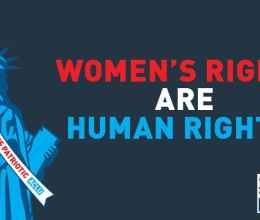In the middle of finals and just before summer break, UCSD administrators emailed students, informing them of a new policy on “Speech, Advocacy and Distribution of Literature” that was to take effect two weeks hence. The proposed policy was sweeping, vaguely worded, and places an undue burden on the activities of those organizing legal demonstrations and protests.
Students, faculty, and concerned administrators contacted the ACLU to determine if the proposed policy was constitutional.
It is not. In an 8-page letter sent to UCSD on November 19, 2007, Legal Director David Blair-Loy said the policy “would significantly threaten freedom of speech, particularly…political speech at the core of the First Amendment.” The letter calls on the Univesrity to decline to adopt the policy unless it is substantially revised to address the multitude of First Amendment problems.
Among the problem areas raised in the letter:
Unconstitutional to require a speaker to be responsible for the actions of others
In what is likely the most clearly unconstitutional aspect of the policy, it requires that every permit application “identify at least one person who shall be legally and financially responsible for the event and activity.” To the extent that this provision holds speakers responsible for the actions of others, it violates the First Amendment.
The First Amendment does not allow the government to hold a speaker or organizer categorically responsible for the actions of others. Organizers of protests cannot ordinarily warrant good faith that all the participants in a demonstration will comply with the law. Demonstrations are often robust. No one could possibly guarantee how each and every demonstrator will behave throughout the course of an entire protest. There is also an abundance of case law holding that the government cannot shift the costs of security or crowd control to a speaker or organizer of a demonstration on public issues.
“This provision of the Policy is immensely dangerous to freedom of speech,” the ACLU states. “The threat of liability for the actions of others would illegally deter individuals from seeking permits and effectively destroy their right to speak out or hold a demonstration.”
Permit requirement is invalid prior restraint
One of the most egregious sections of the policy is titled “Reservations,” and requires students to seek a reservation one day in advance for an event or gathering that can “reasonably expect to attract a crowd of 10 or more people.” Event organizers must identify at least one person who will be legally and financially responsible for the activity.
The ACLU letter says the government bears a heavy burden to justify a prior restraint. While the university has interests in ensuring access to public areas, assuring safety, and preventing unreasonable interference with university activities, a permit requirement for such small groups is not narrowly tailored to serve those interests, and thus violates the First Amendment.
No exception for spontaneous expression
The policy is also unconstitutional because the policy requires advance notice under all circumstances. The right to freedom of speech demands the ability to speak out or demonstrate spontaneously in response to events. As prior case law has noted (Grossman v. City of Portland, 33 F.3d 1200, 9th Cir. 1994), “Spontaneous expression…is often the most effective kind of expression.”
No mandatory deadline for issuing a permit
The proposed policy is vague, stating that a “request for reservation…shall be granted unless” certain exceptions apply, but no deadline is established within which the request must be granted. To survive First Amendment scrutiny, a permit requirement must place limits on the time within which a decisionmaker must issue the license, and must be prompt in order to protect free speech.
Excessive discretion for approval of amplified sound permits
The policy states that any use of amplified sound equipment must be approved in advance by the Facility Manager, though it states no standards to control the Facility Manager’s discretion in granting or denying approval, and thus violates the First Amendment. Another section of the policy prohibits the “set up of free-standing equipment” if the university believes that the equipment “poses a danger to people or property." Once again, the language contains no limits on the subjective discretion of UCSD officials to determine what constitutes “a danger” or how significant that danger must be.
Improperly abridges freedom of speech based on past conduct
The proposed policy would deny a permit to any applicant who “has on prior occasion damaged University property and has not paid in full for such damage.” The ACLU calls the university on two problems with this provision: 1) it incorrectly assumes that any prior damage to University property was unlawful; and more fundamentally, 2) even if it was limited to unlawful damage, the First Amendment does not permit the government to curtail freedom of speech on account of previous conduct, even if that conduct was unlawful. The university could initiate legal proceedings or take appropriate administrative or disciplinary action if damages have not been paid, but the First Amendment does not allow censorship of speech as a sanction.
“Involuntary audiences”
The policy makes it a violation to make “any person an involuntary audience or an involuntary participant of any event or activity.” Both terms are vague, and the law must be clear enough that ordinary people understand what conduct it prohibits; this is especially true when First Amendment freedoms are at stake. Whenever a person speaks in a public place, any passer-by can claim to be an “involuntary audience” or participant. Such a provision is inherently subject to arbitrary or discriminatory enforcement. Additionally, in public debate, citizens must tolerate even outrageous speech in order to provide the protections of the First Amendment. In public, those who object to or dislike certain speech may leave the area or otherwise avoid listening to it.
Keeping political activity separate threatens to chill protected speech
A troubling section of the policy provides that “members of the University staff and faculty must keep their personal Political Activity separate from their institutional role and from University activities.” A public employee does not relinquish First Amendment rights to comment on matters of public interest just because they are a government employee. The policy could have the effect, for example, of preventing a professor from holding a class discussion on political issues, or could prohibit faculty and staff from airing political opinions over lunch. Also, since much of the terminology is vague and sweeping, a faculty or staff member may have no idea if she or he is acting outside of an “institutional role” or participating in “University activities.” The ambiguity could easily chill them from engaging in clearly protected speech, such as giving a public address, participating in a demonstration, or wearing a political button.
Literature on parked cars
The policy also prohibits the placement of literature on parked cars. Such provisions have been struck down by the courts, both inside and outside of college campuses.
ACLU Future Role
The ACLU hopes that the university will honor the traditional academic commitment to freedom of speech, and that it will make all revisions necessary to bring the proposed policy into compliance with the First Amendment. While we hope it will be unnecessary in this case, the ACLU remains ready and able to protect freedom of speech through litigation whenever necessary.
UCSD Proposed Speech Policy Threatens Free Speech
Related Issues
Related content
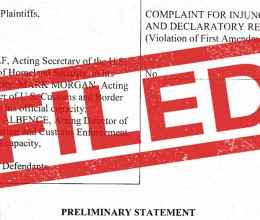
Journalists Sue Federal Government to Defend Free Press in ACLU...
November 21, 2019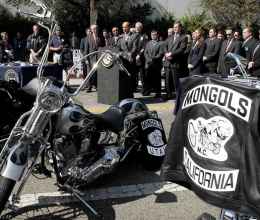
The Justice Department Wants to Strip the Mongols Biker Club of Its...
February 25, 2019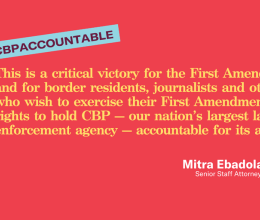
ACLU Statement on Ninth Circuit Decision Affirming First Amendment...
August 14, 2018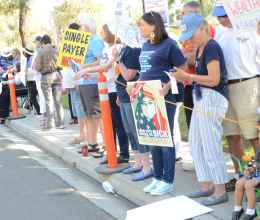
ACLU: CA Law Used to Cite Drivers Who Honk Their Horns During...
June 12, 2018ACLU Wins Suit Over Individuals’ Right to Protest and Monitor...
February 13, 2018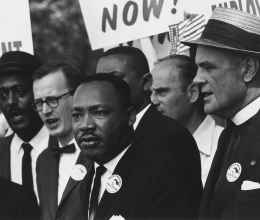
ACLU Condemns El Cajon’s ‘Food Sharing’ Ban and Subsequent Arrests...
January 15, 2018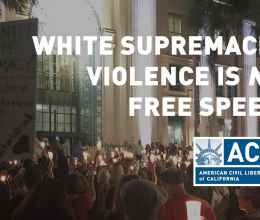
ACLU of California Statement: White Supremacist Violence is not...
August 16, 2017ACLU: City of Vista Must Permit Peaceful Protests Outside Rep....
June 1, 2017